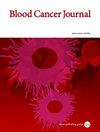亚洲原发性骨髓增生异常肿瘤的临床-基因组预后模型。
IF 11.6
1区 医学
Q1 HEMATOLOGY
引用次数: 0
摘要
考虑到亚洲患者原发性骨髓增生异常肿瘤(MDS)独特分子特征的个性化预后模型尚缺乏。分析亚裔原发性MDS患者的诊断、临床病理特征、细胞遗传学改变和基因突变。评估变量与总生存期(OS)、无白血病生存期(LFS)和进展为继发性AML的时间(TTP-sAML)的相关性。预后评分建立为每个患者预后变量的加权和。该队列包括1225例患者,其中1177例(96%)患者至少发现了一种基因突变。与不良预后相关的基因组因素包括OS的单体7、del(5q)、GNAS和TP53突变;LFS的19三体、del(5q)、7单体和GNAS、PTPN11和TP53突变;i(17q)、del(5q),以及NPM1、NRAS、GNAS、IDH2、SF3B1和RUNX1突变。确定了亚洲预后评分系统(APSS),将患者分为六个预后风险类别。与国际预后评分系统分子(IPSS-M)相比,APSS在该亚洲队列的OS(0.73对0.57)、LFS(0.72对0.59)和TTP-sAML(0.75对0.65)的一致性指数(c指数)更高。总之,APSS增强了亚洲原发性MDS的预后。本文章由计算机程序翻译,如有差异,请以英文原文为准。
A clinico-genomic prognostic model for primary myelodysplastic neoplasm in Asia.
A personalized prognostic model that takes into account the unique molecular features of primary myelodysplastic neoplasm (MDS) in Asia patients is lacking. Diagnostic clinicopathologic features, cytogenetic changes, and gene mutations of ethnic Asian patients with primary MDS were analyzed. Variables were evaluated for associations with overall survival (OS), leukemia-free survival (LFS), and time to progression to secondary AML (TTP-sAML). Prognostic scores were built as a weighted sum of prognostic variables for each patient. The cohort comprised 1225 patients, with at least one gene mutation identified in 1177 patients (96%). Genomic factors associated with inferior outcomes included monosomy 7, del(5q), and GNAS and TP53 mutations for OS; trisomy 19, del(5q), monosomy 7, and GNAS, PTPN11 and TP53 mutations for LFS; and i(17q), del(5q), and NPM1, NRAS, GNAS, IDH2, SF3B1 and RUNX1 mutations for TTP-sAML. The Asian Prognostic Scoring System (APSS) was determined, stratifying patients into six prognostic risk categories. The APSS, compared with the International Prognostic Scoring System molecular (IPSS-M), showed superior concordance indices (C-indices) for OS (0.73 versus 0.57), LFS (0.72 versus 0.59), and TTP-sAML (0.75 versus 0.65) for this Asian cohort. In conclusion, the APSS enhanced prognostication of primary MDS in Asia.
求助全文
通过发布文献求助,成功后即可免费获取论文全文。
去求助
来源期刊

Blood Cancer Journal
ONCOLOGY-
CiteScore
16.70
自引率
2.30%
发文量
153
审稿时长
>12 weeks
期刊介绍:
Blood Cancer Journal is dedicated to publishing high-quality articles related to hematologic malignancies and related disorders. The journal welcomes submissions of original research, reviews, guidelines, and letters that are deemed to have a significant impact in the field. While the journal covers a wide range of topics, it particularly focuses on areas such as:
Preclinical studies of new compounds, especially those that provide mechanistic insights
Clinical trials and observations
Reviews related to new drugs and current management of hematologic malignancies
Novel observations related to new mutations, molecular pathways, and tumor genomics
Blood Cancer Journal offers a forum for expedited publication of novel observations regarding new mutations or altered pathways.
 求助内容:
求助内容: 应助结果提醒方式:
应助结果提醒方式:


